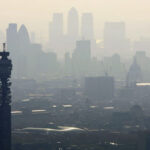Heat Waves Raise Air Quality Hazards, Too

Many parts of Canada are experiencing yet another heat wave. The hot, humid weather exposes workers who work outside to the risk of heat stress and other heat-related illnesses. (Go to the Heat Stress Compliance Center for more information on protecting workers from such illnesses).
But this weather can also result in poor air quality, which can impact workers as well. Workers most at risk when the air quality is bad are those with asthma and other respiratory and heart conditions.
If air quality becomes poor, all workers—even those not at highest risk—may experience symptoms such as irritated eyes, coughing, throat irritation, headaches, difficulty breathing or shortness of breath.
Environment Canada and Health Canada have created an Air Quality Health Index, which assesses the impact of air pollution on people’s health, listing a number from 1 to 10+ to indicate the level of immediate health risk associated with local air quality.
The higher the number, the greater the risk and the greater the need to take precautions for at risk workers. The index, which appears below, describes the level of health risk associated with these numbers as low, moderate, high or very high, accompanied by health advice for the general population and for those at increased risk.
|
Health Risk |
Air Quality Health Index |
Health Messages |
|
|
At Risk Population* |
General Population |
||
|
Low |
1 – 3 |
Enjoy your usual outdoor activities. | Ideal air quality for outdoor activities. |
|
Moderate |
4 – 6 |
Consider reducing or rescheduling strenuous activities outdoors if you are experiencing symptoms. | No need to modify your usual outdoor activities unless you experience symptoms such as coughing and throat irritation. |
|
High |
7 – 10 |
Reduce or reschedule strenuous activities outdoors. Children and the elderly should also take it easy. | Consider reducing or rescheduling strenuous activities outdoors if you experience symptoms such as coughing and throat irritation. |
|
Very High |
Above |
Avoid strenuous activities outdoors. Children and the elderly should also avoid outdoor physical exertion. | Reduce or reschedule strenuous activities outdoors, especially if you experience symptoms such as coughing and throat irritation. |
* People with heart or breathing problems are at greater risk. They should follow their doctor’s usual advice about managing their condition.
To find out the air quality health index in your area, go to this map and select your location. If the index number is high, take appropriate steps to protect workers who are at risk, such as rescheduling outside work when possible.
In addition, jurisdictions may issue health alerts when the air quality becomes particularly poor. For example, Saskatchewan recently issued a health advisory due to poor air quality.